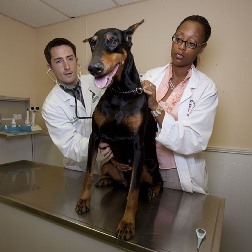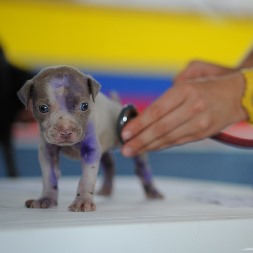How to Find the Right Veterinary Assistant Training near Seneca Illinois
 Realizing your lifelong aspiration of working with and helping animals by enrolling in a veterinarian college near Seneca IL might initially seem like a daunting endeavor. After all, you have to locate and enroll in a college that will furnish the necessary training to ensure that you can succeed as a veterinary technician, assistant or technologist. But just how do you go about analyzing and comparing colleges so that you can make the correct selection? Many aspiring students begin their due diligence process by looking for schools that are close to their residences. When they have found some local colleges, they determine which ones have the most affordable tuition and focus on those. Although location and expense are important considerations when evaluating vet tech schools, they are not the only significant ones when making your comparisons. Qualifiers such as accreditation and internship programs should be evaluated also. The point is that there are questions you should be asking the veterinary tech programs you are looking at before you make an ultimate choice. We have presented several within this article to help get you started, but before we discuss them we’ll talk about the different responsibilities of vet assistants and techs and the training alternatives offered.
Realizing your lifelong aspiration of working with and helping animals by enrolling in a veterinarian college near Seneca IL might initially seem like a daunting endeavor. After all, you have to locate and enroll in a college that will furnish the necessary training to ensure that you can succeed as a veterinary technician, assistant or technologist. But just how do you go about analyzing and comparing colleges so that you can make the correct selection? Many aspiring students begin their due diligence process by looking for schools that are close to their residences. When they have found some local colleges, they determine which ones have the most affordable tuition and focus on those. Although location and expense are important considerations when evaluating vet tech schools, they are not the only significant ones when making your comparisons. Qualifiers such as accreditation and internship programs should be evaluated also. The point is that there are questions you should be asking the veterinary tech programs you are looking at before you make an ultimate choice. We have presented several within this article to help get you started, but before we discuss them we’ll talk about the different responsibilities of vet assistants and techs and the training alternatives offered.
The Job of a Vet Assistant and Technician
 Among the first decisions that you will have to make is if you wish to train as a veterinary technician, assistant or technologist. Part of your preference may be dependent on the amount of time and money that you have to commit to your training, but the primary determiner will undoubtedly be which specialization interests you the most. What vet techs and assistants have in common is that they all work under the immediate guidance of a practicing and licensed veterinarian. And although there are a number of functions that they can carry out within the Seneca IL veterinary clinic or hospital, they can’t prescribe medications, diagnose ailments, or conduct surgical procedures. In those areas they can only provide support to a licensed vet. There are technologists and technicians that work outside of the typical vet practice, such as for zoos, animal shelters or police departments. Let’s take a look at the duties and education requirements for each specialization.
Among the first decisions that you will have to make is if you wish to train as a veterinary technician, assistant or technologist. Part of your preference may be dependent on the amount of time and money that you have to commit to your training, but the primary determiner will undoubtedly be which specialization interests you the most. What vet techs and assistants have in common is that they all work under the immediate guidance of a practicing and licensed veterinarian. And although there are a number of functions that they can carry out within the Seneca IL veterinary clinic or hospital, they can’t prescribe medications, diagnose ailments, or conduct surgical procedures. In those areas they can only provide support to a licensed vet. There are technologists and technicians that work outside of the typical vet practice, such as for zoos, animal shelters or police departments. Let’s take a look at the duties and education requirements for each specialization.
- Vet Assistants in almost all instances will have completed a formal training program, either as an intern or apprentice in a practice, or by finishing a certificate program at a trade school or community college near Seneca IL. As the name implies, their job function is to assist the vets and vet techs in the execution of their duties. Usually they are not associated with more complicated undertakings, for example assisting with surgical procedures. Some of their normal functions may include working at the front desk, cleaning and preparing exam rooms and equipment, or controlling animals during exams.
- Vet Technicians undergo more advanced training in contrast to assistants and typically obtain a two year Associate Degree, preferably from an American Veterinary Medical Association (AVMA) accredited program. They are in a sense the veterinarian equivalent of medical nurses, since their general job function is to assist veterinarians with diagnosing and treating animal patients. Where they differ from veterinary assistants is that they are involved in more complex functions, such as assisting with surgical procedures or administering medicine. All states presently mandate that vet technicians pass a credentialing examination for either certification, registration or licensing.
- Vet Technologists are comparable to veterinary technicians and basically carry out the same work functions. They are mandated to obtain a Bachelor’s Degree in veterinary technology, which generally takes 4 years to complete. So the only real distinction between a vet technician and a technologist is the technologist’s higher level of education. But with an advanced degree comes more work opportunities, higher salaries and potential management positions. They are additionally mandated to pass a credentialing examination for either licensing, registration or certification.
Veterinary technicians and technologists may specialize in areas such as internal medicine, anesthesia or emergency care. A number may acquire certification from the American Association for Laboratory Animal Science (AALAS) to work in laboratories or Seneca IL area research facilities as well.
Veterinarian Online Courses
 An option that might be a solution for those with a hectic schedule or who are working full-time while attending veterinary college is to enroll in an online program. Since the classes are offered over the internet, students can attend on their own timetable wherever a computer is accessible. The curriculum is taught using various venues, including slide shows, videos and live streaming webinars. And since many vet tech and technologist degrees require clinical training, that part can typically be completed as an internship or work study program at an area Seneca IL veterinarian clinic or hospital. Distance learning, as it is also called, may in many instances reduce the cost of your education. Tuition and supplementary costs, for example for traveling and study supplies, can be more affordable compared to more conventional classroom programs. Just be sure that the online school that you enroll in is accredited, either by the AVMA or another nationally certified accrediting agency. With the online courses and the clinical training, everything is included for a comprehensive education. So if you are disciplined enough to learn in this more self-reliant manner, an online vet tech or assistant school may be the ideal choice for you.
An option that might be a solution for those with a hectic schedule or who are working full-time while attending veterinary college is to enroll in an online program. Since the classes are offered over the internet, students can attend on their own timetable wherever a computer is accessible. The curriculum is taught using various venues, including slide shows, videos and live streaming webinars. And since many vet tech and technologist degrees require clinical training, that part can typically be completed as an internship or work study program at an area Seneca IL veterinarian clinic or hospital. Distance learning, as it is also called, may in many instances reduce the cost of your education. Tuition and supplementary costs, for example for traveling and study supplies, can be more affordable compared to more conventional classroom programs. Just be sure that the online school that you enroll in is accredited, either by the AVMA or another nationally certified accrediting agency. With the online courses and the clinical training, everything is included for a comprehensive education. So if you are disciplined enough to learn in this more self-reliant manner, an online vet tech or assistant school may be the ideal choice for you.
What to Ask Veterinary Assistant and Technologist Colleges
 By now you should have decided on which veterinary certificate or degree that you would like to earn, and if you intend to study online or attend a program on campus. Since there are a large number of vet community colleges, technical and vocational schools in Illinois and across the United States, you must ask some qualifying questions to help narrow down your list of options. As we mentioned in our introduction, many prospective students start by focusing on location and the cost of tuition. But we have already mentioned other significant qualifiers, for example internship programs and accreditation. And of course you need to choose a college that offers the degree and specialty that you would like to earn. These and other qualifications are covered in the list of questions that you need to ask the Seneca IL veterinary assistant and tech schools that you are considering.
By now you should have decided on which veterinary certificate or degree that you would like to earn, and if you intend to study online or attend a program on campus. Since there are a large number of vet community colleges, technical and vocational schools in Illinois and across the United States, you must ask some qualifying questions to help narrow down your list of options. As we mentioned in our introduction, many prospective students start by focusing on location and the cost of tuition. But we have already mentioned other significant qualifiers, for example internship programs and accreditation. And of course you need to choose a college that offers the degree and specialty that you would like to earn. These and other qualifications are covered in the list of questions that you need to ask the Seneca IL veterinary assistant and tech schools that you are considering.
Is the Veterinary College Accredited? It’s important that you make sure that the vet tech or assistant program you choose is accredited by a regional or national accrediting agency. As previously mentioned, among the most highly respected is the American Veterinary Medical Association (AVMA). Vocational schools and colleges that are accredited by the AVMA have gone through a demanding review process that ensures you will receive a quality education. Also, accreditation is necessary if you are applying for a student loan or financial assistance, since a large number of programs are not obtainable for non-accredited colleges. And finally, having a certificate or degree from an accredited school is in many cases a precondition for employment for a number of Seneca IL veterinary practices and hospitals.
What is the School’s Reputation? The vet vocational school or college and program you enroll in should have an excellent reputation within the vet field. You can begin your due diligence by asking the colleges you are looking at for references from the employers in their job placement network. Other pointers include checking with online school ranking websites and speaking with the school’s accrediting organizations as well. You can ask the Illinois school licensing department if there have been any grievances or violations involving your targeted schools. As a final pointer, get in touch with some Seneca IL veterinary clinics that you may wish to work for after you go through your training. Ask what they think about your school choices. They might even suggest some schools not on your list.
Are Internships Offered? The most effective approach to obtain practical hands on training as a vet assistant or tech is to work in a professional setting. Find out if the colleges you are considering have internship programs arranged with regional veterinarians, vet practices or hospitals. Most veterinary medicine programs require practical training and a large number furnish it through internships. Not only will the experience be beneficial as far as the clinical training, but an internship may also help develop relationships in the local Seneca IL veterinarian community and aid in the search for employment after graduation.
Is there a Job Assistance Program? Finding a job after graduating from a vet technician or assistant program may be difficult without the help of a job placement program. To start with, ask what the graduation rates are for the programs you are reviewing. A lower rate could suggest that the instructors were unqualified to teach the curriculum or that a number of students were dissatisfied with the program and quit. Next, verify that the schools have a job placement program and find out what their placement rates are. A higher placement rate may mean that the Seneca IL college has an outstanding reputation within the veterinarian community and has a significant network of contacts for student placements. A low rate might indicate that the training is not highly regarded by employers or that the job placement program is a failure at placing students.
How Big are the Classes? If the classes are larger sized, you probably will receive little or no personalized instruction from the teachers. Request from the Seneca IL schools you are researching what their class student to teacher ratios are. You may also decide to participate in some classes (if practical) to monitor the interaction between students and instructors. Get feedback from students relating to the quality of instruction. Also, talk with the teachers and find out what their qualifications are as well as their methods of teaching.
Where is the Campus Located? Okay, we previously discussed location, but there are a few more points to make on the topic. If you are planning to commute to your veterinary assistant classes from work or home, you have to confirm that the commuting time is compatible with your schedule. For instance, driving during the weekend to investigate the route won’t be the same as the drive during rush hour traffic, particularly if the Seneca IL campus is located near or in a large city. In addition, if you do opt to enroll in a college in another state or even outside of your County of residence, there may be increased tuition costs particularly for state and community colleges. Of course attending classes online may be an alternative that will provide you with more flexibility and minimize the need for travel.
Do the Classes Fit Your Schedule? And last, it’s important that you determine if the Illinois vet colleges you are looking at offer class times flexible enough to fit your schedule. For example, a number of students continue working full time and can only attend classes on the weekends or in the evenings. Others might only be able to go to classes in the morning or later in the afternoon. Make sure that the class times you need are offered near Seneca IL before enrolling. In addition, determine if you can make up classes that you might miss due to sickness, work or family issues. You might find that an online program is the best way to fit your vet education into your busy life.
Why Did You Choose to Be a Veterinary Technician?
When prepping to interview for a veterinary job, it's helpful to reflect on questions you might be asked. Among the things that interviewers typically ask veterinary candidates is "What compelled you to select veterinary care as a career?". What the interviewer is attempting to learn is not only the private reasons you may have for being a veterinary technician, but also what characteristics and talents you have that make you outstanding at your profession. You will undoubtedly be asked questions relating exclusively to veterinary care, as well as a significant number of typical interview questions, so you need to ready some strategies about how you want to address them. Considering there are several variables that go into selecting a career, you can address this primary question in a variety of ways. When preparing an answer, aim to include the reasons the profession interests you as well as the talents you have that make you an outstanding vet tech and the perfiect candidate for the position. Don't make an effort to memorize a response, but jot down several ideas and topics that relate to your personal strengths and experiences. Reviewing sample answers can help you to formulate your own thoughts, and inspire ideas of what to discuss to wow the recruiter.Enroll in the Ideal Veterinary Tech College near Seneca IL
Picking the appropriate veterinary technician program is an important first step to beginning a gratifying career delivering care and treatment for pets and livestock. Potential students thinking about veterinary tech or assistant schools must make their determination based on several key factors. Veterinary techs, assistants and technologists work in vet clinics, animal hospitals and animal shelters. They commonly take on administrative responsibilities and support the veterinarian with the animals as needed. As we have discussed, it’s very important that you choose a veterinary medicine program that is both accredited and has an outstanding reputation within the field. This goes for vet tech online schools as well. By asking the questions provided in our checklist for assessing schools, you will be able to narrow down your options so that you can make your final selection. And by choosing the ideal program, you can reach your goal of becoming a vet technician, assistant or technologist in Seneca IL.
A Little Bit About Seneca IL
Seneca the Younger
Seneca the Younger (c. 4 BC – AD 65), fully Lucius Annaeus Seneca and also known simply as Seneca (/ˈsɛnɪkə/), was a Roman Stoic philosopher, statesman, dramatist, and—in one work—humorist of the Silver Age of Latin literature.
Seneca was born in Cordoba in Hispania, and raised in Rome, where he was trained in rhetoric and philosophy. He was a tutor and later advisor to emperor Nero. He was forced to take his own life for alleged complicity in the Pisonian conspiracy to assassinate Nero, in which he was likely to have been innocent.[1][2] His father was Seneca the Elder, his elder brother was Lucius Junius Gallio Annaeanus, and his nephew was the poet Lucan. His stoic and calm suicide has become the subject of numerous paintings. As a writer Seneca is known for his philosophical works, and for his plays which are all tragedies. His philosophical writings include a dozen philosophical essays, and one hundred and twenty-four letters dealing with moral issues. As a tragedian, he is best-known for his Medea and Thyestes.
Seneca was born at Córdoba in the Roman province of Baetica in Hispania.[3] His father was Lucius Annaeus Seneca the elder, a Spanish-born Roman knight who had gained fame as a writer and teacher of rhetoric in Rome.[4] Seneca's mother, Helvia, was from a prominent Baetician family.[5] Seneca was the second of three brothers; the others were Lucius Annaeus Novatus (later known as Junius Gallio), and Annaeus Mela, the father of the poet Lucan.[6]Miriam Griffin says in her biography of Seneca that "the evidence for Seneca's life before his exile in 41 is so slight, and the potential interest of these years, for social history as well as for biography, is so great that few writers on Seneca have resisted the temptation to eke out knowledge with imagination."[7] Griffin also infers from the ancient sources that Seneca was born in either 8, 4, or 1 BC. She thinks he was born between 4 and 1 BC and was resident in Rome by AD 5.[7]
More Cities of Interest in Illinois
